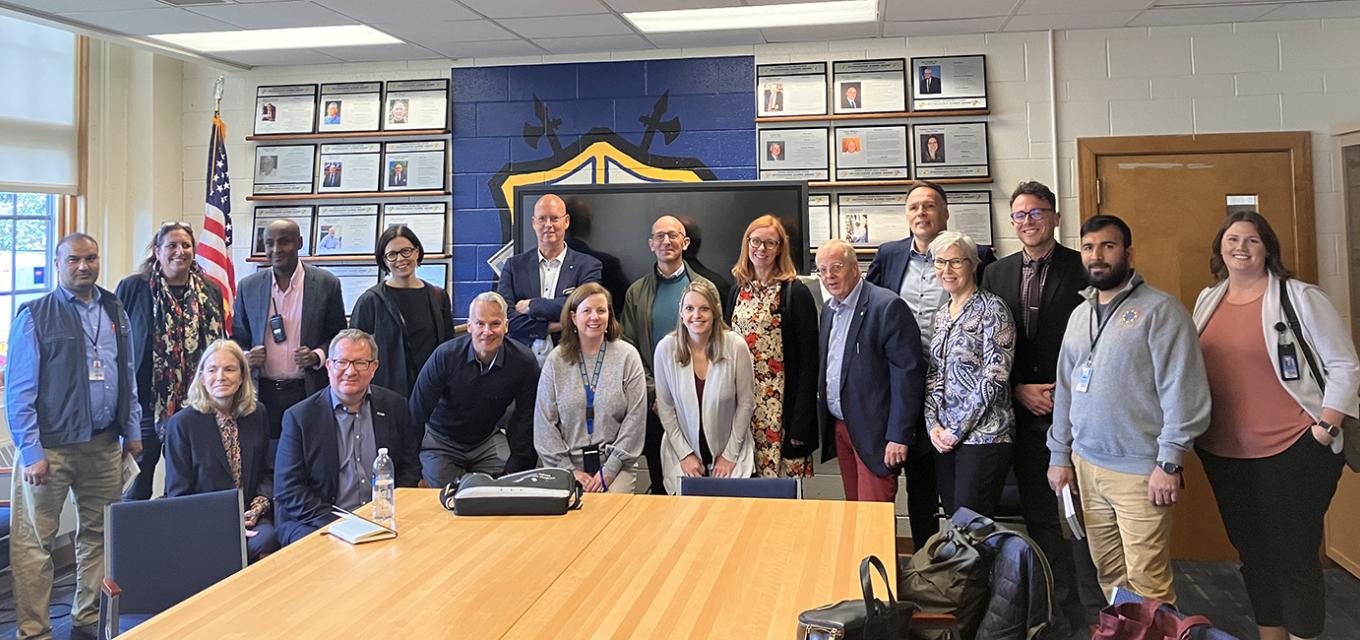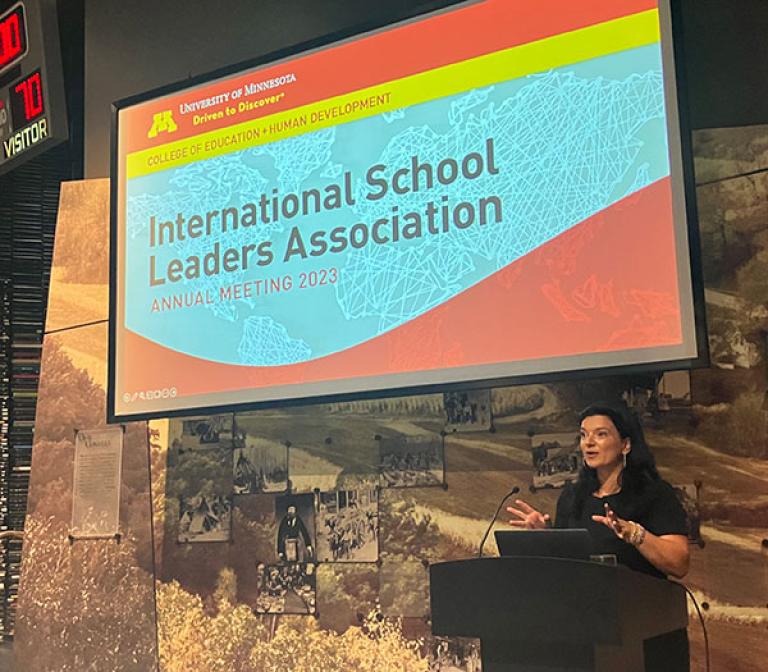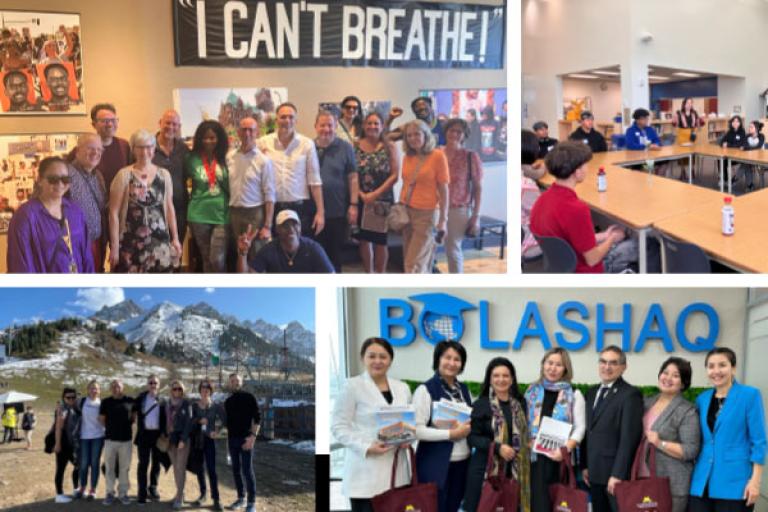News

Centering relationships and learning
Faculty collaboration advances CEHD’s international mission and diversity efforts.
School leaders return to CEHD
A group of European school administrators visited CEHD for a week last fall as part of an educational exchange program that has been regularly taking place around the world since 2016. The International School Leaders Association (ISLA), officially named in 2020, brings together education leaders from Europe and the United States. Members leverage their unique expertise from their local communities to examine various approaches to promoting the economic and social advancement of minority, refugee, and immigrant youth. The CEHD visit this fall was co-sponsored by the U.S. State Department.
“It was a fantastic opportunity to make new connections and learn about new practices and approaches, in addition to building upon very effective existing relationships and furthering my knowledge of different educational systems,” says Graeme Brown, one of His Majesty’s Inspectors (HMI) of Education in Scotland. Brown’s duties include supporting improvement and providing assurance both within schools and across Scottish education. An important takeaway for Brown was learning about different approaches to some common school problems. “I found work being done in Minnesota on anti-racist education and discussions around political literacy and education in the U.S. and beyond to be particularly interesting for my own education system’s context and development,” he says.

ISLA’s annual meetings are an opportunity for colleagues to collaborate, share ideas, and exchange resources. Through the years it has become an important learning community for the group of international school leaders. “I loved meeting with my European and U.S. colleagues to share our visions of the world of education in our different countries,” says Magali Gallais, a senior education advisor at Albert Camus Middle School in Clermont-Ferrand, France. Gallais says French schools must be more open to different cultures. “I brought back with me a piece of North American culture—a culture of tolerance,” she says. “As well I brought back a lot of friendship and human warmth.”
Peter Stumpf, an associate headteacher at Cranford Community College in London, says the hospitality of the University, led by International Initiatives Director Marina Aleixo, was stunning. “The blend of formal input from University faculty and experts in the field combined with visits to schools and community groups was superbly planned and threaded seamlessly together,” he says.
Stumpf says he was keenly interested in the work of Executive Director of Educational Leadership Katie Pekel, particularly her research into the workload of principals in Minnesota. He found they resonated with his experiences as a principal in the UK. “These challenges are not unique to one country or culture, and the demands of school leadership are similar across many countries,” he says. “As a group we also had much time to talk about and share our experiences with each other.”
Stumpf says Cranford is looking forward to welcoming Aleixo this spring to lead a workshop and to a future study trip for its staff to the U of M where they can continue to develop their partnership work together to support young people in need. “Thank you for a great week!” he says.

Faculty experience in Kazakhstan
For the past two years, CEHD has been working on building its collaboration with educational institutions in the Central Asian country of Kazakhstan. “As a college we believe global partnerships are opportunities to gain new perspectives and deepen our understanding of different fields of study,” says Aleixo.
In October, a group of CEHD faculty members spent 10 days in Kazakhstan visiting some of its educational institutions, collaborating in meetings, and presenting their research and work.
“Our trip to Kazakhstan was immensely educational and rewarding in so many ways,” says Department of Organizational Leadership, Policy, and Development Professor Andrew Furco. “In addition to visiting a diverse set of higher education institutions in Almaty and Astana and learning about Kazakhstan’s incredible history and its peoples, the members of our delegation had the chance to reconnect with CEHD alumni, share some of our own work with our gracious hosts and with each other, and plan future goals and new activities with our Kazakhstan partners.”
For Department of Family Social Science Professor Catherine Solheim, the experience was an opportunity for learning and reflection. “It renews my commitment to invest time and energy to build relationships and collaborate with scholars from this part of the world, and to share access to resources whenever possible,” she says.
“The beauty of this is that while I hope our work together helps my international colleagues to achieve their goals, my own career and life are immensely enriched from our collaborations.” Zhuldyz Amankulova, a current postdoc in CEHD, helped organize and lead the trip. “Our time in Kazakhstan provided a platform for dialogue and knowledge exchange, contributing to CEHD’s efforts to meaningfully engage with existing partners and foster new relationships,” she says. “One of the important outcomes of the visit was signing the Memorandum of Understanding with the JSC Center for International Programs, an administrator of Kazakhstan’s international programs such as the prestigious Bolashak scholarship and 500 scholars program.”
CEHD’s growing relationship with Kazakhstan is the result of its successful Research, Pedagogy, and Leadership visiting scholars’ program. CEHD faculty participating in the October visit had served as hosts and collaborators for Kazakh scholars in 2022.
“The success of this visit would not have been possible without the support of our local partners,” Aleixo says. “All 13 original visiting Kazakh scholars contributed to the planning of our time in Kazakhstan; organizing visits to their various institutions, hosting events, and leading cultural excursions.”
Zeinep Zhumatayeva, assistant professor at Nazarbayev University, helped organize activities in Astana, including a symposium focused on Modern Trends in Education and Language Learning. The joint symposium was attended by more than 150 local faculty, students, and public figures.
“I hope that this symposium will be a good start to future mutually beneficial partnerships between our universities,” says Zhumatayeva.
In Almaty, CEHD was welcomed by Ainur Begimbetova, director of the Institute of Energy and Green Technology, Almaty University of Power Engineering and Telecommunications. The joint symposium in Almaty focused on topics related to global partnerships, virtual collaboration, and community engagement.
“These partnerships and communities of learning provide unique global opportunities for the university community, allowing our students and faculty to develop cultural, research and academic connections,” says Begimbetova
The college is currently welcoming its second cohort of scholars.
Photo credits: International Initiatives
-KEVIN MOE